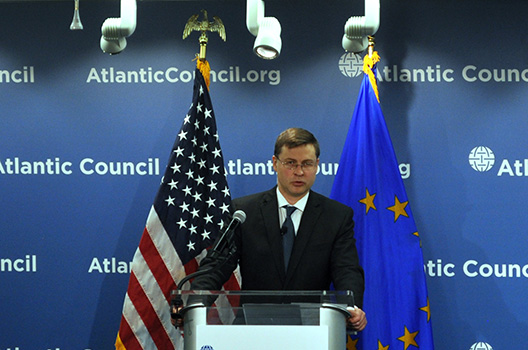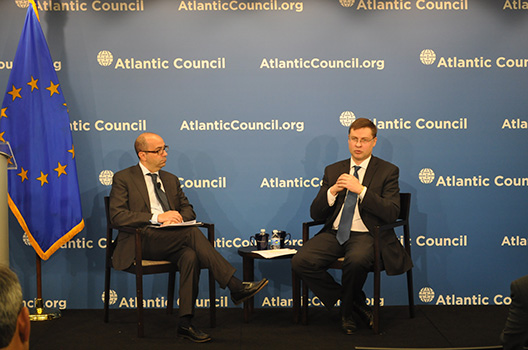 On April 16, 2015 the Global Business and Economics Program hosted a EuroGrowth Conversation Series event with European Commission Vice President Valdis Dombrovskis, focusing on the future of the European Union and how to get Europe back to growth.
On April 16, 2015 the Global Business and Economics Program hosted a EuroGrowth Conversation Series event with European Commission Vice President Valdis Dombrovskis, focusing on the future of the European Union and how to get Europe back to growth.
The event brought together several leading policymakers as well as high-ranking representatives from international organizations, think tanks, academia, and the private sector in a small off-the-record roundtable followed by a larger public event. Frederick Kempe, President and CEO of the Atlantic Council, opened the conversation, followed by Vice President Dombrovski’s insightful keynote speech and a brief Q&A moderated by Andrea Montanino, Director of the Atlantic Council’s Global Business and Economics program.
The event was gathered to address questions about the European Union’s short-term and long-term future, given the recent double-dip recession as well as internal and external factors likely to impact the European economy such as global energy prices, quantitative easing policies, exchange rate policies, and the economic struggles of individual European member states. Europe’s economic recovery and job creation has been slow, with growth rates gradually accelerating from 1.3% this year to an expected 1.9% in 2016. Mr. Dombrovskis noted that declining oil prices, quantitative easing policies, and low interest rates have positively contributed to Europe’s recovery. While low inflation has caused concerns, it will normalize over time, with the European Central Bank achieving its inflation targets and helping to evaluate debt burdens.

The conversation also focused on finding the right policy mix to bring the European economy back to growth. Mr. Dombrovskis noted that boosting investment, structural reforms both at the EU and member state levels, as well as monetary policy and fiscal discipline were essential to future European growth. In fact, Mr. Dombrovskis underlined how Europe’s strength was its ability to adapt and introduce the necessary change in institutional designs in order to overcome crises and economic slumps.
This is an important period for the European Union. As Greece and Ukraine continue to look for sustainable solutions to their current situations, many will look to European leadership to coordinate the spheres of responsibility, resolve the institutional weaknesses of the EU architecture, and overcome inertia. The Eurogrowth Conversation Series will continue to inform the public discussion on issues like these in Washington and beyond as the situation progresses.
The EuroGrowth Conversation Series is a recurring discussion series at the Atlantic Council analyzing the prospects for European economic recovery and a forum for new and innovative ideas to be shared among leading policymakers, academics, and the private sector.
